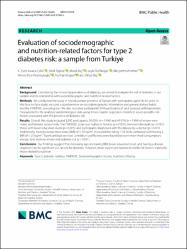Evaluation of sociodemographic and nutrition-related factors for type 2 diabetes risk: a sample from Turkiye

Göster/
Erişim
info:eu-repo/semantics/openAccessTarih
2025Yazar
Karaca Çelik, K. EsenToprak, Dilek
Baş, Murat
Tevfikoğlu, Leyla
Kahriman, Meryem
İnce Palamutoğlu, Merve
Doğan, Nurhan
Baş, Dilşat
Üst veri
Tüm öğe kaydını gösterKünye
Karaca-Çelik, K. E., Toprak, D., Baş, M., Tevfikoğlu, L., Kahrıman, M., İnce-Palamutoglu, M., ... & Baş, D. (2025). Evaluation of sociodemographic and nutrition-related factors for type 2 diabetes risk: a sample from Turkiye. BMC Public Health, 25(1), 858.Özet
Background Considering the increasing prevalence of diabetes, we aimed to evaluate the risk of diabetes in our sample and its relationship with sociodemographic and nutrition-related factors. Methods We conducted the study in Afyonkarahisar province of Turkiye with participants aged 18-65 years. In this face-to-face study, we used a questionnaire on sociodemographic information and general dietary habits and the FINDRISC screening tool. We also recorded participants' 24-hour food recall and assessed anthropometric measurements. We analyzed epidemiological data using binary logistic regression models to assess possible risk factors associated with the presence of diabetes risk. Results Overall, this study included 3,990 participants, 50.03% (n = 1996) and 49.97% (n = 1994) of whom were males and females, respectively. The FINDRISC score was higher in females (p = 0.001), married individuals (p < 0.001), those with lower education levels (p < 0.001), and participants diagnosed with the disease by a doctor (p < 0.001). Additionally, having a body mass index (BMI) of > 30 kg/m(2 )increased the risk by 7.33 folds compared with having a BMI of < 25 kg/m(2). Significant but very low correlation coefficients were found between main meal consumption, energy, lipid and iron intake and diabetes risk (p < 0.001). Conclusions Our findings suggest that increasing age, increasing BMI, lower education level, and having a disease diagnosis can be significant risk factors for diabetes. However, more studies are needed to clarify risk factors, especially those related to nutrition.
















